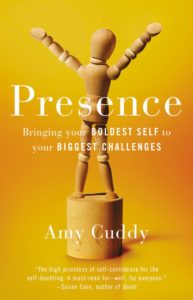Our Blog
Interested in Subscribing to our blog?
Do you have Presence?
Have you ever been in a difficult conversation only to leave the conversation moments later and think of that perfect thing you should have said? Or maybe it was a presentation you gave where you didn’t feel at your best? Harvard Business School social psychologist Amy Cuddy first became mainstream when she delivered a TED talk about how body language — posing our bodies in expansive, confident postures can change our internal chemistry. That Ted Talk is below and worth a watch. I recently read her latest book titled, Presence: Bringing Your Boldest Self to Your Biggest Challenges, where she explains that presence is the “state of being able to comfortably express our true thoughts and feelings and values and talents and knowledge harnessed at the right moment — knowing who you are and being able to access that when you most need to.” This is critical in a difficult conversation, a presentation, and yes, even a job interview.
The author explains that the state of Presence is not something we achieve all the time; it is a “come and go” thing but it is not required that we embark on a large scale spiritual quest to harness the power of presence. Instead, she explains, we can achieve better presence through tweaks in our body language, behavior, and mind-set in our day-to-day lives.
The book goes into detail exploring various scientific studies and how they illustrate her points. One of those studies involved analyzing videos of over 180 different venture capital presentations looking for both verbal and non-verbal behavior. The study showed the strongest predictor of who received the money was not the person’s credentials or the specific content of the pitch. Rather, it was traits such as confidence, comfort level, and passionate enthusiasm. In other words, the people that were fully present in the moment and not concerned with how they were doing or what the venture capitalists thought about them did the best. As I read the book, I could not help but see the correlations and parallels to JMOs interviewing for positions in Corporate America. In our 47+ years of helping JMOs transition to business, we have yet to see a single JMO get hired solely based on their resume, not when interviewing for leadership positions within a company. But, we have seen more than one, get ruled out for lack of what Amy Cuddy describes as presence. Just as with the venture capital presentations, recruiters are looking for candidates with enthusiasm, confidence, comfort, etc. All of these are signs of being authentic. The more authentic we can be, the more convincing we can be to show a company we are a good fit for the position and their company. Whether you are a JMO transitioning to Corporate America or simply someone looking to be their best selves in those critical moments, I highly recommend the book.
Rob Davis



